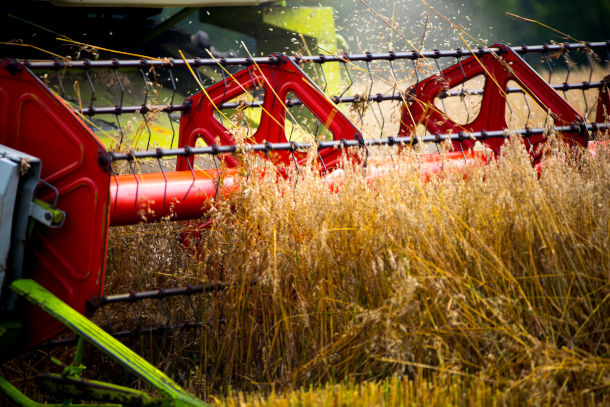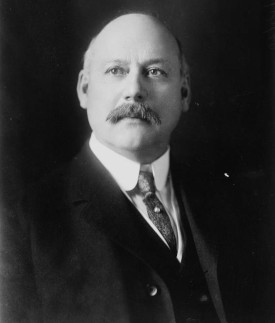Beyond the Headlines
Air Date: Week of March 1, 2024

Chlormequat is applied to crops like oats to prevent them from drooping and make them easier to harvest. However, animal studies suggest that it may have harmful health effects related to fertility and fetal development. (Photo: Tim Jokl, Flickr, CC BY-NC 2.0)
Living on Earth contributor Peter Dykstra joins Host Aynsley O’Neill with news of a study showing a particular pesticide that’s present in 80% of U.S. adults. Then, the two discuss some 450 state bills asking for PFAS legislation on the docket in 2024. Finally, the pair take a look at some key historical moments surrounding national lands.
Transcript
BELTRAN: It’s Living on Earth, I’m Paloma Beltran.
O'NEILL: And I'm Aynsley O'Neill.
And it's time now in the broadcast for a check in with Peter Dykstra. Peter is a contributor to Living on Earth and he looks beyond the headlines for us. He's on the line now from Atlanta, Georgia. Hi, Peter. What do you have for us this week?
DYKSTRA: Hi, Aynsley. first story is about a new pesticide to worry about, oh, joy: chlormequat. There had been previous animal studies that found chlormequat to potentially impact reproduction, weight, and bone development. There's a study done by scientists at an interest group, the Environmental Working Group, that was published in a peer reviewed journal, Journal of Exposure Science and Environmental Epidemiology. The study is the first one done in the US on adults, and 80% of those tested had chlormequat in their urine.
O'NEILL: 80% is kind of a lot, Peter. What is this pesticide and where is it found?
DYKSTRA: It's used in some ornamental plants, but also it's used in imported grains like wheat, oats, and barley. Those grain crops grown in the US, chlormequat is not allowed. And here's the thing. It's not what you normally think of as a pesticide that kills weeds or kills bugs. Chlormequat slows the growth of the stems, keeps the crops from bending over and makes harvesting easier. We'll have to see if further research confirms that it's a risk for humans.
O'NEILL: We'll have to keep an eye on it, Peter. What else do you have for us this week?
DYKSTRA: Here's a report domestically and more politically about PFAS, those so called "forever chemicals." The group Safer States found that this could be a big year for PFAS legislation on the state level, also other toxic chemicals. 36 states have more than 450 bills up for consideration on toxic chemicals. PFAS with all of the suspected health risks and confirmed health risks are high on the list as well. So going to be a good year to watch and see what happens with chemical legislation in more than two thirds of our states.

36 states will soon consider more than 450 bills related to toxic chemicals and plastics, according to an analysis by Safer States. (Photo: martin gautron, Flickr, CC BY-NC 2.0)
O'NEILL: Peter, we talk about these forever chemicals so much on the show. It feels pretty good to see almost 500 different bills all working to maybe reduce some of these toxic chemicals in our world.
DYKSTRA: But they're only bills, they have to be passed and signed. And we'll see in each of those 36 states how far that process gets.
O'NEILL: Yeah. And to find out whether your state is or isn't looking at these toxics go to our website, loe.org. But before we let you go, Peter, it is time for a history lesson.
DYKSTRA: Yeah, we have a doubleheader on trees. Going back to March 1, 1911. The Week's Act was signed by President Taft in response to major threats to forests in the Eastern US. The Weeks Act, sponsored by Congressman John Weeks of Massachusetts authorizes the purchase of land for national forests and the protection of watersheds and also supports fire protection efforts. On the other hand, Congressman and later Senator Weeks was a strict opponent of women's suffrage.
O'NEILL: Well, that's a bit of a trade off Peter, especially with women's history month. But what is the other story you've got for us, Peter?

The Weeks Act, sponsored by Congressman John Weeks of Massachusetts and signed by President Taft in March 1911, authorized the purchase of land for national forests and the protection of watersheds, and supported fire protection efforts. Unfortunately, Weeks was also a strict opponent of women's suffrage. (Photo: George Grantham Bain, Wikimedia Commons, no known copyright restrictions)
DYKSTRA: It's from early March 1966. A widely held misquote from future president, California gubernatorial candidate Ronald Reagan. He's always said to have said, "If you've seen one tree, you've seen them all." What is believed to be the correct quote, not much better in terms of environmental values, Reagan said in an interview in the Sacramento Bee and also in a public speech about expanding Redwood National Park in California, quote, "A tree is a tree. How many more do you need to look at?"
O'NEILL: Well, thank you for bringing us both these pieces of history, Peter, but you are missing a key historical event that we absolutely must cover here at Living on Earth. March 2, 1957, environmental historian and King of snark himself, Peter Dykstra is born in Hackensack, New Jersey.
DYKSTRA: Let's go Jersey!
O'NEILL: Let's go Jersey! Peter Dykstra is a contributor to Living on Earth and we will talk to you again real soon.
DYKSTRA: All right, Aynsley. Thanks a lot. Talk to you soon.
O'NEILL: And Happy Birthday!
DYKSTRA: Thank you!
O'NEILL: And there's more stories on the Living on Earth webpage, that's loe.org.
Links
Read the study about chlormequat in food and urine samples:
Find out which states are considering bills related to toxic chemicals and plastics:
Living on Earth wants to hear from you!
Living on Earth
62 Calef Highway, Suite 212
Lee, NH 03861
Telephone: 617-287-4121
E-mail: comments@loe.org
Newsletter [Click here]
Donate to Living on Earth!
Living on Earth is an independent media program and relies entirely on contributions from listeners and institutions supporting public service. Please donate now to preserve an independent environmental voice.
NewsletterLiving on Earth offers a weekly delivery of the show's rundown to your mailbox. Sign up for our newsletter today!
 Sailors For The Sea: Be the change you want to sea.
Sailors For The Sea: Be the change you want to sea.
 The Grantham Foundation for the Protection of the Environment: Committed to protecting and improving the health of the global environment.
The Grantham Foundation for the Protection of the Environment: Committed to protecting and improving the health of the global environment.
 Contribute to Living on Earth and receive, as our gift to you, an archival print of one of Mark Seth Lender's extraordinary wildlife photographs. Follow the link to see Mark's current collection of photographs.
Contribute to Living on Earth and receive, as our gift to you, an archival print of one of Mark Seth Lender's extraordinary wildlife photographs. Follow the link to see Mark's current collection of photographs.
 Buy a signed copy of Mark Seth Lender's book Smeagull the Seagull & support Living on Earth
Buy a signed copy of Mark Seth Lender's book Smeagull the Seagull & support Living on Earth

